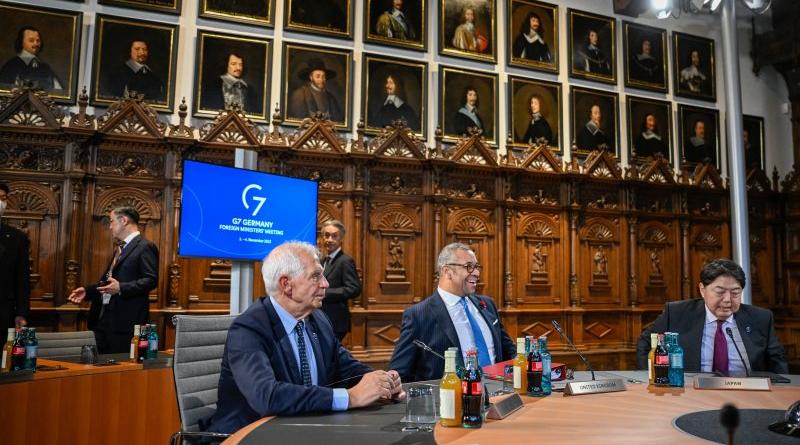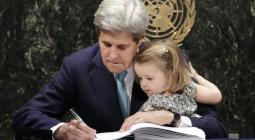EU’s climate leadership is now on foreign ministers

EU Foreign Affairs Ministers will meet in Brussels on Monday (20 February) to set the agenda for climate diplomacy in 2023. They will succeed only if they give a strong mandate for an ambitious EU climate foreign policy that is fit for the polycrisis environment, write Belinda Schäpe and Jule Könneke.
Belinda Schäpe is climate diplomacy researcher on EU-China relations at E3G. Jule Könneke is policy advisor in E3G’s geopolitics, diplomacy and security team.
The world is currently neither on track to prevent devastating climate impacts, nor prepared to deal with its consequences. The international community is falling far short of the climate goals set in the Paris Agreement.
Impacts are already hitting countries earlier and harder than expected and the finance gap is widening amidst a strained global economic environment hit by multiple crises.
2023 needs to see effective cooperation on cutting emissions, managing debt, tackling rising trade tensions, and responding to climate impacts. This year will pave the way for the next big climate moment in 2025 when global emissions will have to peak.
But geopolitical fracturing is feeding a competitive approach from major emitters like China and has disbanded traditional high-ambition coalitions that have shaped global political will in the past.
The EU has a major role to play this year and the upcoming gathering of foreign ministers will set the tone for this. The EU was crucial in brokering a historic outcome on loss and damage at COP27, supporting calls by vulnerable countries whose rising power was on display.
However, a lack of coordination prevented the EU to secure a package of action through COP27 or Germany’s G7 presidency. On 20 February, EU Foreign Affairs Ministers will meet in Brussels to agree on the agenda for climate diplomacy in 2023.
The conclusions of the gathering are an opportunity to set out a strong mandate for ambitious climate diplomacy and a vision for EU climate foreign policy that effectively rallies partners around a faster transition.
The starting position is promising: the EU and its member states will hold significant sway in international fora over the next two years.
Italy as G7 presidency in 2024, Germany supporting the incumbent Japanese G7, the Netherlands co-leading the Coalition of Finance Ministers for Climate Action, and France co-hosting a summit on a “New Financial Pact” with the Global South together with Barbados.
The EU should harness these moments to inject momentum into delivering climate outcomes and raise the bar for climate ambition in international venues such as the G7, G20, the UNFCCC and UNGA.
But that will only be possible if foreign ministers give a strong mandate for an ambitious EU climate diplomacy agenda backed by domestic commitments. These should focus on three key areas.
First, leading consensus around a global fossil fuel phase-out mandate and championing a first movers coalition on setting ambitious climate targets for 2035 and 2040. This needs to be supported by EU leadership on implementation at home.
The EU could recognise the critical role that renewables have played in improving energy security and the potential of reducing fossil fuel imports through a rapid expansion of clean energy and storage technologies.
Second, mobilising EU and global finance for transitions and impact responses for countries hit hardest by the global energy, food, and economic crises.
The EU could show support for initiatives that will alleviate fiscal pressure on middle- and low-income countries. These include the Bridgetown Initiative, the Capital Adequacy Framework review and a strong evolution roadmap for the World Bank and other multilateral development banks.
Third, deploying EU industrial and trade policy and joining up diplomatic outreach to incentivise other major emitters to decarbonise faster.
The EU could expand beyond traditional climate diplomacy to explore the whole toolbox of autonomous measures such as the Carbon Border Adjustment Mechanism for major emitters to align with industrial decarbonisation goals.
To deliver this mandate, the new Group of Friends (GoF) for an ambitious EU climate diplomacy could become an important new vehicle for coordinating member states’ positions and implementing this mandate.
To do so, close coordination with the European External Action Service (EEAS), DG CLIMA, and related DGs will be central to using all available tools of the Green Deal more effectively to accelerate the transition also beyond the EU.
For this to succeed, the EU needs to appoint a strong successor for the current EU Climate Ambassador Marc Vanheukelen who steps down this summer. The upcoming Foreign Affairs Council is crucial to stepping up the EU’s climate foreign policy ambition and driving the global transition in times of crisis.
Ministers must give a clear mandate for the EU to lead the way on a global fossil fuel phase-out, mobilise finance for countries hit hardest by crises, and deploy industrial and trade policy that incentivises other countries to decarbonise faster. This time, the EU’s climate leadership is on them
cover: Ministers must give a clear mandate for the EU to lead the way on a global fossil fuel phase-out, mobilise finance for countries hit hardest by crises, and deploy industrial and trade policy that incentivises other countries to decarbonise faster. This time, the EU’s climate leadership is on them. [Copyright: European Union]




